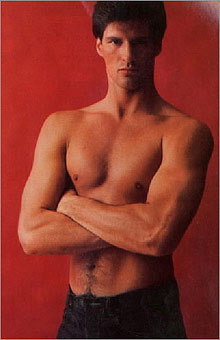
BARING HIS SOUL Brown's memoir uses his childhood to avoid talking about who he is now. |
Brown's memoir,
Against All Odds, tells the inspiring rags-to-riches tale of how one can rise from terrible circumstances to great power and influence, with just a little hard work, perseverance, supermodel good looks and world-class athletic ability.
This is surely an important and inspirational story for all the other young Richard Gere look-alikes captaining their school sports teams while struggling to maintain hope. And it makes for lighter reading than the pompous, calculated posturings of most political auto-hagiographies.
But it doesn't get us any further into understanding Scott Brown, career politician — and that is surely not by accident. As brave as it may be for Brown to reveal the hard details of his early life, doing so allows him to get away with disclosing nothing of his adult years — or his ideology.
Brown, a Republican who needs conservatives nationwide to fund his upcoming re-election bid, must appeal to moderate and Democratic voters for that victory. Since his election a year ago, he has tried to thread that needle with careful votes and comments — and, mostly, by avoiding any discussion of his actual opinions on the issues.
How to maintain that political blank slate when writing his life story — and through the press interviews in the promotional book tour? Brown and his political team (whom he thanks for reviewing and commenting on the manuscript) managed it by telling us everything about Brown as a boy and young adult, and nothing about him as a grown man — particularly during his nearly two decades in elected office.
Brown's six years as a state representative, for example, are covered in a single paragraph. His six as state senator get little more. Not that there is all that much to tell — to be fair, not much can be expected from a Republican in the Democratic-dominated Massachusetts legislature — but he could have shared his thoughts on his votes against same-sex marriage and for landmark environmental laws, to take just two examples.
By contrast, the book lingers over every detail of his pre-political life, no matter how personal, painful, or trivial. They include the already famous gripping accounts of sexual assaults he suffered, as well as numerous tales of his physically and emotionally abusive stepfathers. There are lengthy descriptions of his surroundings, his sports achievements (including, at times, game-by-game accounts), his resentments, his clothes, his neighbors, the roads he biked on, the landmarks of Route 1, his shoplifting escapades, the Cosmo photo shoot (which gets far more space than his entire 12-year stint on Beacon Hill), Studio 54 parties, his National Guard training, his daughters' births, and his wife's post-partum depression.
At times it seems like an unfiltered memory-dump. We learn that he lost his virginity in junior high school, to an 18-year-old babysitting his sister. He explains his methods for stealing records and food. We watch him learning to read the horse-racing form; encountering coke-snorting celebrities in New York; hooking up with a sexy French-Canadian woman in Jamaica; waking up from a blackout in a woman's apartment; and, in a memorable Guard sky-jumping vignette, having a bag filled with his own vomit explode all over him.